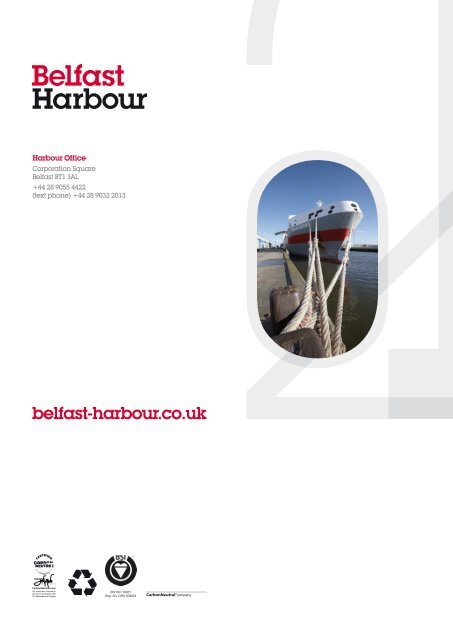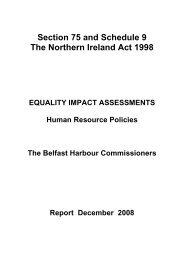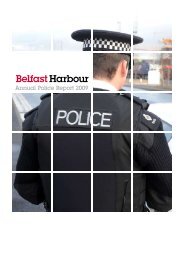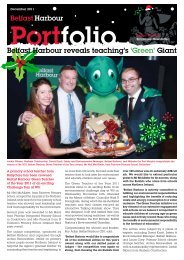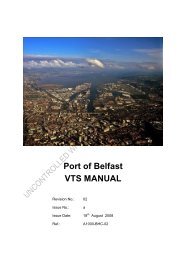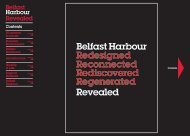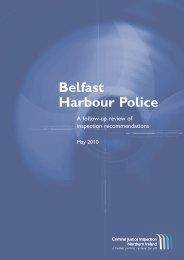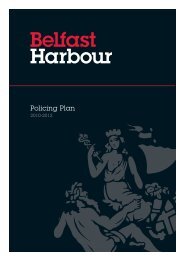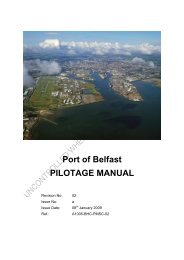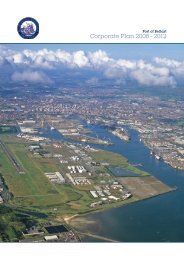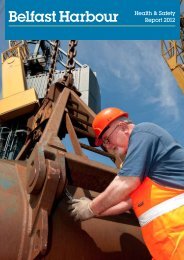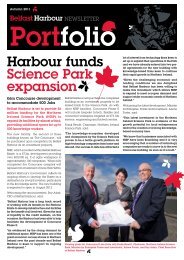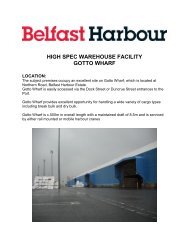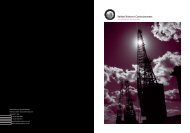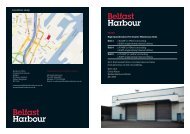Download - Belfast Harbour
Download - Belfast Harbour
Download - Belfast Harbour
Create successful ePaper yourself
Turn your PDF publications into a flip-book with our unique Google optimized e-Paper software.
<strong>Harbour</strong> Office<br />
Corporation Square<br />
<strong>Belfast</strong> BT1 3AL<br />
+44 28 9055 4422<br />
(text phone) +44 28 9032 2013<br />
BSI ISO 18001<br />
Reg. No. OHS 508824
Annual Report & Accounts 2010
Annual Report & Accounts 2010<br />
Contents<br />
page<br />
1 Chairman’s Statement 04<br />
2 The Organisation 07<br />
3 Chief Executive’s Review 14<br />
4 <strong>Belfast</strong> <strong>Harbour</strong> and the Community 19<br />
5 Corporate Matters 23<br />
6 Annual Accounts 24<br />
7 Trade and Shipping Statistics 43<br />
3
1 Chairman’s Statement<br />
Leonard J. P. O’Hagan DL<br />
Chairman<br />
While the UK’s recession officially ended in<br />
the last quarter of 2009, economic activity<br />
remained subdued throughout 2010 across<br />
<strong>Belfast</strong> <strong>Harbour</strong>’s three main markets of<br />
Northern Ireland, Great Britain and the<br />
Republic of Ireland.<br />
£17.4m<br />
<strong>Belfast</strong> <strong>Harbour</strong> Profit<br />
before Taxation<br />
4
Annual Report & Accounts 2010<br />
Performance<br />
Despite the difficult trading circumstances in the<br />
wider economy, <strong>Belfast</strong> <strong>Harbour</strong> returned an excellent<br />
financial performance with Sales of £34.7m and Profits<br />
before Taxation of £17.4m. Net Assets increased to £263m.<br />
Positive progress was also made with regard to trade<br />
passing through the Port, with tonnages rising for the<br />
first time in three years, up by 5.4% to 16.4m tonnes.<br />
Of particular note was the record 2m tonnes of Grain<br />
& Animal Feeds handled, reflecting the strong 2010<br />
performance and competitiveness of Northern Ireland’s<br />
Agri-Food sector.<br />
The <strong>Harbour</strong>’s ability to support this growing sector<br />
is based upon a long-term capital investment strategy<br />
which has established <strong>Belfast</strong> as one of the leading bulk<br />
cargo ports on the island. This strategy has also sought<br />
to diversify the <strong>Harbour</strong>’s activities and provide customers<br />
across all trade sectors with the most advanced and<br />
efficient marine facilities in Ireland. In the past decade,<br />
the <strong>Harbour</strong> has spent £154m on capital projects, including<br />
almost £6m in 2010 with further commitments of £51m<br />
initiated. All expenditure has and will continue to be<br />
funded entirely from the <strong>Harbour</strong>’s own revenue streams.<br />
Competition within the Irish Sea port sector remains<br />
strong and <strong>Belfast</strong> <strong>Harbour</strong> continues to liaise with the<br />
Northern Ireland Assembly to progress legislation –<br />
agreed in February 2008 - that will enhance its<br />
competitiveness. Such legislation will also help the <strong>Harbour</strong><br />
maintain and enhance its capital investment plans for the<br />
benefit of both the Port and local economy.<br />
It will also support the diversification of its business<br />
activities, particularly the exploitation of new opportunities<br />
in the environmental sector.<br />
During 2010, for example, an initial £500,000 was invested<br />
in preliminary works in preparation for a £53m investment<br />
in a new Terminal to serve the offshore wind energy<br />
industry. Construction of the facility is due to commence<br />
in summer 2011. This investment is part of a long-term<br />
strategy of developing a Marine Energy Park to help<br />
establish <strong>Belfast</strong> as a hub for the emerging green economy.<br />
Irish Sea Developments<br />
2010 also marked the first full year of operation<br />
for new, larger vessels on the <strong>Belfast</strong> – Heysham route<br />
with continued healthy performance on both the <strong>Belfast</strong> –<br />
Liverpool and <strong>Belfast</strong> – Stranraer routes. A total of 313,000<br />
freight vehicles were carried by the Port’s Ro-Ro ferry<br />
operators in 2010, representing an increase of 2%<br />
on the previous year’s total.<br />
Stena Line’s plans to develop a new ferry terminal in<br />
Scotland are proceeding well and the new facility is<br />
due to open at the mouth of Loch Ryan in autumn 2011.<br />
This will reduce sailing distances between <strong>Belfast</strong> and<br />
Scotland, enhancing service provision.<br />
Urban Regeneration<br />
While marine operations (including the provision<br />
of related logistics space) remain at the core of <strong>Belfast</strong><br />
<strong>Harbour</strong>’s activities, property projects are an integral part<br />
of the <strong>Harbour</strong> business. Such projects within the <strong>Harbour</strong><br />
Estate represent the single largest concentration of urban<br />
regeneration schemes within Northern Ireland, stimulating<br />
economic activity, improving the City’s built environment<br />
and creating a focal point for Foreign Direct Investment.<br />
Titanic Quarter remains one of Europe’s largest urban<br />
waterfront schemes and notable progress was made<br />
during 2010, including the completion of the first<br />
residential phase, completion of a new headquarters<br />
for the Public Record Office of Northern Ireland and<br />
the opening of the development’s first hotel. During<br />
2010, planning approval was granted for a 660,000 sq ft<br />
Financial Services Centre, and work continued apace on<br />
the new <strong>Belfast</strong> Metropolitan College (planned opening<br />
September 2011) and the £97m Titanic <strong>Belfast</strong> visitor<br />
attraction (planned opening April 2012).<br />
Master-planning for City Quays, a complementary<br />
regeneration scheme located on the opposite bank<br />
of the Victoria Channel was completed and an outline<br />
planning application was submitted in July 2010.<br />
Other developments within the <strong>Harbour</strong> Estate included<br />
the lodging of planning permission for an additional<br />
230,000 sq ft of space at Sydenham Business Park, the<br />
completion of Bombardier’s new hi-tech facility for the<br />
production of wing and engine nacelles, the opening<br />
of a new state-of-the-art Audi car showroom by the<br />
Agnew Group and ongoing work with Invest NI to<br />
promote the area as a hub for inward investment.<br />
Community Outreach<br />
<strong>Belfast</strong> <strong>Harbour</strong>’s commitment to support local communities<br />
through the use of educational, environmental and arts<br />
projects resulted in the delivery of a number of innovative<br />
projects such as the Green Teacher of the Year competition,<br />
Webster’s Waterworks (in conjunction with the Ulster<br />
Orchestra) and bursaries to support young people’s<br />
participation in the Lyric Theatre’s Summer Outreach<br />
Programme. In addition the <strong>Harbour</strong> Office hosted<br />
a significant number of community, charity, educational<br />
and business events.<br />
Finally thanks are due, as always, to the Board<br />
of <strong>Belfast</strong> <strong>Harbour</strong> - <strong>Belfast</strong> <strong>Harbour</strong> Commissioners –<br />
the management team and all our staff who continue<br />
to ensure that <strong>Belfast</strong> <strong>Harbour</strong> remains the cornerstone<br />
of Northern Ireland’s economic infrastructure and<br />
a significant driver of the local economy.<br />
Leonard J. P. O’Hagan DL<br />
Chairman<br />
5
Annual Report & Accounts 2010<br />
2 The Organisation<br />
The Board<br />
The Board of the <strong>Belfast</strong> <strong>Harbour</strong> Commissioners<br />
was first constituted by the <strong>Belfast</strong> <strong>Harbour</strong> Act 1847<br />
as a corporate body with the underlying purpose of<br />
operating, maintaining and improving the Port of<br />
<strong>Belfast</strong>. The powers and duties of the Board are limited<br />
to those conferred by the various <strong>Belfast</strong> <strong>Harbour</strong> Acts<br />
and Orders 1847-2002, and any relevant public general<br />
Acts such as the <strong>Harbour</strong>s Act (NI) 1970. In common with<br />
other Northern Ireland and Great Britain ports similarly<br />
constituted, the Port of <strong>Belfast</strong> is generally referred<br />
to as a ‘Trust Port’.<br />
The Department for Regional Development (DRD)<br />
appoints Board Members on the basis of open public<br />
advertisement. The number of Board Members,<br />
including the Chairman and Chief Executive Officer,<br />
may be no less than 10 and no more than 15, with up to<br />
four Board Members being elected representatives from<br />
<strong>Belfast</strong> City Council.<br />
The management of <strong>Belfast</strong> <strong>Harbour</strong> is independent<br />
of Government and is the responsibility of the Board<br />
and the Executive Team. The duties of the Board<br />
Members are akin to those of a company director,<br />
in particular, to be accountable for the proper exercise<br />
of the statutory and administrative requirements placed<br />
upon them. In addition, Board Members are required to:-<br />
1 Ensure high standards of corporate governance;<br />
2 Establish the overall strategic direction of the<br />
Port having regard to the best interests of the Port<br />
and the local economy following consultation with<br />
key stakeholders;<br />
3 Ensure that, in reaching decisions, Government<br />
policy and relevant guidance provided by the<br />
sponsor Department are taken into account;<br />
4 Ensure that, in carrying out their functions,<br />
due regard is paid to the need to promote equality<br />
of opportunity.<br />
Board Committees<br />
The Board operates a Committee system with the<br />
objective of maintaining high standards of corporate<br />
governance and streamlining the work of the Board.<br />
The Chairman of the Board is Chairman of the<br />
Commercial Projects and Remuneration Committees.<br />
All Board Members are also members of at least<br />
two of the Board’s Committees.<br />
<strong>Belfast</strong> <strong>Harbour</strong> Pension Fund Limited<br />
The sole function of the <strong>Belfast</strong> <strong>Harbour</strong> Pension Fund<br />
Limited is to act as Trustee to The <strong>Belfast</strong> <strong>Harbour</strong><br />
Commissioners’ Pension Scheme, operated for the benefit<br />
of the Board’s employees. The Directors of the <strong>Belfast</strong><br />
<strong>Harbour</strong> Pension Fund Limited comprise four Board<br />
Members, including the Chief Executive Officer, as well<br />
as two Directors nominated by the scheme membership.<br />
Commercial Projects Committee<br />
The role of the Commercial Projects Committee<br />
is to consider major commercial projects.<br />
Corporate Governance & Audit Committee<br />
The Corporate Governance & Audit Committee<br />
is responsible, on behalf of the Board, for: -<br />
1 Monitoring the integrity of the organisation’s<br />
financial statements;<br />
2 Reviewing the organisation’s internal financial<br />
control and risk management systems;<br />
3 Monitoring and reviewing the effectiveness<br />
of the organisation’s internal audit function;<br />
4 Monitoring and reviewing the external auditors’<br />
independence, objectivity and effectiveness.<br />
Neither the Chairman of the Board nor the Chief<br />
Executive Officer are members of this Committee,<br />
but they are entitled to attend meetings.<br />
Remuneration Committee<br />
The primary duty of the Remuneration Committee<br />
is to set policy on remuneration and related matters,<br />
and to ensure that such remuneration policy facilitates<br />
the employment and retention of senior personnel.<br />
The Committee is also responsible for senior<br />
management appointments.<br />
Safety, Environmental & Security Committee<br />
The Safety, Environmental & Security Committee<br />
advises the Board on all aspects of safety, environment<br />
and security throughout the Port and <strong>Harbour</strong> Estate,<br />
including ongoing obligations under the Port Marine<br />
Safety Code and the operation of <strong>Belfast</strong> <strong>Harbour</strong> Police.<br />
Property Committee<br />
The Property Committee considers major land issues not<br />
related to pure Port operations within the Commissioners’<br />
land stewardship role. It is particularly concerned with<br />
all matters relating to the Titanic Quarter regeneration<br />
project on land formerly used for shipbuilding and<br />
occupied by Harland & Wolff.<br />
7
Board Member Profiles<br />
Back (left to right) – Noel Brady, Councillor Cathal Mullaghan, Steve Pollard, Councillor David Rodway,<br />
Middle (left to right) – Peter Curistan, Councillor Danny Lavery, Dr Trefor Campbell CBE, Ross Reed OBE, Peter Dixon, David Russell,<br />
Front (left to right) – Roy Adair, Ronnie Foreman, Leonard J. P. O’Hagan DL, Mary McMahon.<br />
Not pictured – Councillor David Browne & Lord Mayor Patrick Convery<br />
8
Annual Report & Accounts 2010<br />
Leonard J. P. O’Hagan DL Chairman<br />
Len O’Hagan was appointed Chairman of <strong>Belfast</strong><br />
<strong>Harbour</strong> Commissioners in December 2006 and<br />
has been reappointed for a further term of four years.<br />
Len has held senior positions in a number of<br />
international public companies including CEO<br />
of Fitzwilton Plc, Managing Director of the Jefferson<br />
Smurfit Group and Chairman of Safeway Ireland.<br />
Len is currently the Chairman of OHC Corporate<br />
Advisers Ltd, a business consultancy company,<br />
Chairman of Rockingham Motor Circuit, Chairman<br />
of The MAC - The Metropolitan Arts Centre, and a<br />
Champion for Arts and Business Northern Ireland.<br />
He is also Vice President of the Ireland-US Council.<br />
Roy Adair Chief Executive Officer<br />
Roy Adair was appointed Chief Executive of <strong>Belfast</strong><br />
<strong>Harbour</strong> Commissioners in 2005. Roy’s career began<br />
in a number of engineering and manufacturing roles. He<br />
became the first Chief Executive of the Northern Ireland<br />
Quality Centre in 1990 before joining electronics group<br />
DDL Inc in 1994 to run Irlandus Circuits, a company<br />
which he subsequently bought from the Group in 1999.<br />
Roy has been involved as a non-executive in a range<br />
of organisations including the Prince’s Trust, Business<br />
in the Community, UK Major Ports Group and Invest<br />
Northern Ireland. He was appointed HRH Prince of<br />
Wales Ambassador for Corporate Social Responsibility<br />
in Northern Ireland in May 2007, is President Emeritus of<br />
the General Stevedoring Council, chairs the Diaspora<br />
initiative, NI Connections, and is a member of The US<br />
Economic Envoy’s Working Group.<br />
Councillor David Browne<br />
During 2010, Councillor David Browne was an elected<br />
member of <strong>Belfast</strong> City Council. He was appointed<br />
to the Board in July 2005. In addition to being the former<br />
High Sheriff of <strong>Belfast</strong>, Councillor Browne is a member<br />
of several <strong>Belfast</strong> City Council Committees and Chairman<br />
of Grove Housing Association and was elected as Deputy<br />
Lord Mayor of <strong>Belfast</strong> in 2008. In 2010, David was a<br />
member of the Corporate Governance & Audit Committee<br />
and the Safety, Environmental & Security Committee.<br />
Ronnie Foreman<br />
Ronnie Foreman was appointed to the Board in January<br />
2005. Ronnie is Chairman of several organisations,<br />
including Eaga (Heat) Ireland Plc and SIAC (NI) Ltd.<br />
He is NI Ambassador for the Haven Charity and also<br />
self-employed as a Business Development Consultant.<br />
Ronnie was formerly Chairman of the Statistics Advisory<br />
Committee, Board Member of ENCOUNTER and owner<br />
of Alpha Controls Ltd. During 2010, Ronnie was Chair<br />
of the Safety, Environmental & Security Committee,<br />
a member of the Commercial Projects Committee<br />
and a Director of the <strong>Belfast</strong> <strong>Harbour</strong> Pension Fund Ltd.<br />
Mary McMahon<br />
Mary McMahon is a self-employed social policy<br />
researcher. She was appointed to the Board in<br />
November 2002. She is a member of a number of<br />
voluntary community organisations concerned with<br />
social justice, poverty, marginalisation and exclusion.<br />
Mary was appointed as Chair of the Public Health<br />
Agency in 2009. During 2010, Mary was a member of<br />
the Safety, Environmental & Security Committee and the<br />
Corporate Governance & Audit Committee.<br />
Steve Pollard<br />
Steve was appointed to the Board in November<br />
2002. Steve is Managing Director of Janus Training &<br />
Development Ltd and a Director of Creative Exchange<br />
Ltd. He is currently employed within the Ulster Business<br />
School, University of Ulster, where he lectures in<br />
Management Development. Steve is actively involved<br />
in a number of community economic development<br />
initiatives and research in the area of entrepreneurship<br />
and enterprise development. During 2010, Steve was<br />
a member of the Commercial Projects Committee and<br />
the Safety, Environmental and Security Committee.<br />
Ross Reed OBE<br />
Ross was appointed to the Board in January 2002.<br />
Ross is a Chartered Accountant by profession with<br />
a background in freight transport, warehousing and<br />
distribution. He is Chairman and Managing Director<br />
of Interfrigo Ltd and Managing Director of Antrim<br />
Warehousing & Distribution Services Ltd. Ross is also<br />
a Director of the Leuven Institute for Ireland and<br />
Europe. Ross is Chair of the Corporate Governance &<br />
Audit Committee and a member of the Remuneration<br />
Committee and the Safety, Environmental<br />
& Security Committee.<br />
Councillor David Rodway<br />
During 2010, Councillor David Rodway was an elected<br />
member of <strong>Belfast</strong> City Council. Councillor Rodway,<br />
an Aquaculture Consultant by profession, was appointed<br />
to the Board of <strong>Belfast</strong> <strong>Harbour</strong> Commissioners in 2007.<br />
In addition to being a member of a number of <strong>Belfast</strong> City<br />
Council Committees, Councillor Rodway is also on the<br />
Board of Governors of the <strong>Belfast</strong> Metropolitan College<br />
and sits on the finance and resources committees.<br />
He is also part of the Nomadic Trust. In 2010, Councillor<br />
Rodway was a member of the Safety, Environmental<br />
& Security Committee and the Property Committee.<br />
9
Peter Dixon<br />
Peter Dixon was appointed to the Board in 2008.<br />
With a career spent within the gas industry, Peter<br />
is currently Group Chief Executive of Phoenix Energy<br />
Holdings Limited. He is a past Chairman of the Irish<br />
Section of IGEM. Peter holds a number of Board positions<br />
within the Holding Group. He is also Chairman of the<br />
Energy for Children Charitable Trust, a Board Member<br />
of Business in the Community, Chairman of Arena<br />
Network and a Board member of The Prince’s Trust.<br />
He is also a Lord Taverner and Board member of Men<br />
against Cancer. During 2010, Peter was a member of<br />
the Corporate Governance & Audit Committee and the<br />
Commercial Projects Committee.<br />
Noel Brady<br />
Noel Brady was appointed to the Board in 2008.<br />
Noel is Managing Director of Consult Nb1 Limited,<br />
a business development consultancy which he founded<br />
in 2004 that provides executive support services to<br />
international and national clients. Following an early<br />
career in the Northern Ireland Civil Service, Noel held<br />
key senior management positions with CFM Group<br />
Ltd, ICL and Sx3, providing over 36 years experience<br />
of working in both the public and private sectors. He is<br />
an Honorary Fellow and Chairman of the Sales Institute<br />
of Ireland. Noel was recently appointed as Chairman<br />
of the Corporate Fund Raising Committee of the Simon<br />
Community in Northern Ireland. During 2010, Noel was<br />
a member of the Corporate Governance & Audit<br />
Committee and the Commercial Projects Committee.<br />
Councillor Danny Lavery<br />
During 2010, Councillor Danny Lavery was an elected<br />
member of <strong>Belfast</strong> City Council. He was appointed to<br />
the Board of <strong>Belfast</strong> <strong>Harbour</strong> Commissioners in July 2008.<br />
Councillor Lavery is a member of numerous Council<br />
Committees including the Development Committee<br />
and the Strategic Policy & Resources Committee. He is<br />
Chairman of the Town Planning Committee, a member<br />
of the Titanic Quarter Working Group, the North <strong>Belfast</strong><br />
Partnership Board and a Board member of the <strong>Belfast</strong><br />
Education & Library Board (BELB). In 2010, Councillor<br />
Lavery was a member of the Safety, Environmental<br />
and Security Committee and the Corporate Governance<br />
and Audit Committee.<br />
Councillor Cathal Mullaghan<br />
During 2010, Councillor Mullaghan was an elected<br />
member of <strong>Belfast</strong> City Council. He was appointed<br />
to the Board of <strong>Belfast</strong> <strong>Harbour</strong> Commissioners in August<br />
2010. Councillor Mullaghan is a member of several<br />
<strong>Belfast</strong> City Council committees and was the former chair<br />
of the Health and Environment committee. Councillor<br />
Mullaghan is also a Non-Executive Director on the Board<br />
of the Public Health Agency and on the Board of Libraries<br />
Northern Ireland. He also sits on the Board of Governors<br />
of Hazelwood Integrated College. In 2010, Councillor<br />
Mullaghan was a member of the Property Committee<br />
and <strong>Belfast</strong> <strong>Harbour</strong> Pension Board Fund Ltd.<br />
Dr Trefor Campbell CBE<br />
Dr Trefor Campbell was appointed to the Board in 2008.<br />
Trefor was formerly Non Executive Chairman of Moy<br />
Park Ltd. Trefor is Patron and NI Council Member of the<br />
Prince’s Trust, Companion of the Chartered Management<br />
Institute, a Fellow of the Royal Society of Agriculture,<br />
a Fellow of the Royal Society for Arts & Commerce and<br />
a Liveryman of the Worshipful Company of Poulters.<br />
During 2010, Trefor was Chairman of the <strong>Belfast</strong><br />
<strong>Harbour</strong> Pension Fund Ltd, a member of the Corporate<br />
Governance & Audit Committee and a member of the<br />
Property Committee.<br />
Peter Curistan<br />
Peter Curistan was appointed to the Board in 2008.<br />
A chartered accountant by profession, Peter is Chairman<br />
of Sheridan Group, which he founded in 1989. The Group,<br />
which specialises in mixed-use development with a<br />
particular emphasis on leisure and entertainment, has<br />
property interests in <strong>Belfast</strong>, Dublin and Bournemouth.<br />
A former IoD ‘Entrepreneur of the Year’, Peter is a visiting<br />
Professor at the NI Centre for Entrepreneurship (NICENT)<br />
in the University of Ulster and holds an honorary<br />
Doctorate from Queen’s University, <strong>Belfast</strong>, conferred for<br />
his contribution to the economic life of Northern Ireland.<br />
During 2010, Peter was a member of the Commercial<br />
Projects Committee and the Safety, Environmental and<br />
Security Committee.<br />
David Russell<br />
David was appointed to the Board in January 2002.<br />
David Russell is a Non-Executive Director of Phoenix<br />
Natural Gas Limited and Portaferry Regeneration Limited,<br />
and is an Independent Board Member of the Department<br />
of Agriculture and Rural Development (DARD). In 2010,<br />
David was Chair of the Property Committee, a member<br />
of the Remuneration Committee and the Commercial<br />
Projects Committee.<br />
Councillor Patrick Convery<br />
In 2010, Patrick Convery was is an elected member<br />
of <strong>Belfast</strong> City Council. He was appointed to the Board<br />
of <strong>Belfast</strong> <strong>Harbour</strong> Commissioners in July 2008. Councillor<br />
Convery is a member of numerous Council Committees<br />
including the Strategic Policy & Resources and<br />
Development Committees. He is a member of the <strong>Belfast</strong><br />
District Policing Partnership, the North <strong>Belfast</strong> Partnership<br />
Board and a Board member of the <strong>Belfast</strong> Education<br />
& Library Board (BELB). During 2010, Councillor Convery<br />
was a member of the Property Committee and a Director<br />
of the <strong>Belfast</strong> <strong>Harbour</strong> Pension Fund Ltd. Councillor<br />
Convery left the Board in June 2010 to take up the Office<br />
of Lord Mayor of <strong>Belfast</strong>.<br />
10
Annual Report & Accounts 2010<br />
Commissioners’ Overall Attendance<br />
Board Meetings Committee Meetings Total Meetings<br />
Attended<br />
Percentage of<br />
Total Meetings<br />
Attended<br />
Name Possible Actual Possible Actual Possible Actual %<br />
Adair, Roy 8 8 18 18 26 26 100<br />
Brady, Noel 8 8 5 4 13 12 92<br />
Browne, David 8 7 6 5 14 12 86<br />
Campbell, Trefor 8 8 11 11 19 19 100<br />
Convery, Patrick* 4 4 4 4 8 8 100<br />
Curistan, Peter 8 8 7 4 15 12 80<br />
Dixon, Peter 8 7 5 4 13 11 85<br />
Foreman, Ronnie 8 7 14 10 22 17 77<br />
Lavery, Danny 8 6 6 3 14 9 64<br />
McMahon, Mary 8 7 6 6 14 13 93<br />
O’Hagan, Len 8 8 8 8 16 16 100<br />
Pollard, Steve 8 7 7 5 15 12 80<br />
Reed, Ross 8 8 7 6 15 14 93<br />
Rodway, David 8 8 6 5 14 13 93<br />
Russell, David 8 7 6 5 14 12 86<br />
Mullaghan, Cathal** 4 4 5 4 9 8 89<br />
* Councillor Convery’s term ended in July when he took up Office as Lord Mayor of <strong>Belfast</strong><br />
** Councillor Mullaghan replaced Councillor Convery from July 2010<br />
11
Executive Team<br />
Roy Adair Chief Executive Officer<br />
Roy Adair was appointed Chief Executive of <strong>Belfast</strong><br />
<strong>Harbour</strong> Commissioners in 2005. Roy’s career began<br />
in a number of engineering and manufacturing roles.<br />
He became the first Chief Executive of the Northern<br />
Ireland Quality Centre in 1990 before joining electronics<br />
group DDL Inc in 1994 to run Irlandus Circuits,<br />
a company which he subsequently bought from<br />
the Group in 1999.<br />
Roy has been involved as a non-executive in a range<br />
of organisations includes the Prince’s Trust, Business<br />
in the Community, UK Major Ports Group and Invest<br />
Northern Ireland. He was appointed HRH Prince of<br />
Wales Ambassador for Corporate Social Responsibility<br />
in Northern Ireland in May 2007, is President Emeritus of<br />
the General Stevedoring Council, chairs the Diaspora<br />
initiative, NI Connections, and is a member of The US<br />
Economic Envoy’s Working Group.<br />
2. Maurice Bullick Finance Director<br />
A Chartered Accountant by profession, Maurice joined<br />
the organisation in 2000. Previously Maurice was<br />
Financial Controller of Cawoods Fuels and had worked<br />
within Price Waterhouse’s Accountancy Division.<br />
3. Graeme Johnston Property Director<br />
Graeme trained both as a Chartered Surveyor and<br />
Chartered Project Management Surveyor. He joined the<br />
organisation in 2007 having held a number of senior<br />
positions in the banking and retail sectors. Previously<br />
Graeme was Property Director for the Henderson Group<br />
and was all-Ireland Property Manager for the Ulster Bank.<br />
4. Patricia Toolan Human Resources Manager<br />
Patricia joined <strong>Belfast</strong> <strong>Harbour</strong> Commissioners in 2002 as<br />
Human Resources Manager. Prior to her appointment,<br />
Patricia was Human Resources Manager in Nortel<br />
Networks NI & Europe and occupied Human Resources<br />
and Business Planning Roles within the BBC over a<br />
10-year period. Patricia is a member of the Chartered<br />
Institute of Personnel Development.<br />
5. Trevor Anderson Operations Director<br />
Trevor is an engineer by profession and joined the<br />
organisation in 2006 from Bombardier Aerospace. Trevor<br />
had spent a total of 22 years with Bombardier in a<br />
number of roles including Head of Enterprise Systems for<br />
Bombardier Aerospace Worldwide based in Montreal,<br />
Canada.<br />
6. Joe O’Neill Commercial Director<br />
Joe joined the organisation in 1997, holding a number<br />
of roles within the Port of <strong>Belfast</strong> including Commercial<br />
Manager and Port Manager before being appointed<br />
Commercial Director in 2005. Prior to joining the Port,<br />
Joe was Trading Manager for Undus Ltd and Quality<br />
Manager for Cantrell and Cochrane Ltd.<br />
12
Annual Report & Accounts 2010<br />
13
3 Chief Executive’s Review<br />
Roy Adair<br />
Chief Executive<br />
14
Annual Report & Accounts 2010<br />
Financial Performance<br />
The trading financial<br />
performance for <strong>Belfast</strong> <strong>Harbour</strong><br />
was very satisfactory with Profit<br />
before Taxation at £17.4m.<br />
Trading<br />
Trading improved during the year with Turnover<br />
increasing by 5% to £34.7m. Operating Profit was<br />
£15.0m and Profit before Taxation was £17.4m.<br />
All Trust Ports have an obligation to earn a commercially<br />
acceptable rate of return on their assets, which is mainly<br />
achieved by charges on port and other facilities.<br />
Capital Expenditure<br />
All profits net of taxation are reinvested in the<br />
development of port and estate facilities, for the<br />
benefit of businesses within the <strong>Harbour</strong>, and<br />
the NI economy in general.<br />
Capital expenditure for 2010 was £5.7m. A further<br />
£62.8m was committed to capital projects and the<br />
Titanic Project, but not spent at the 2010 year end.<br />
Funding of these development projects is derived<br />
from cash flow. Liquids funds at the end of 2010<br />
were £60.7m, all of which is committed to future projects.<br />
<strong>Belfast</strong> <strong>Harbour</strong> is a major infrastructure investor;<br />
and the economic benefits of this investment to NI are<br />
considerably in excess of the direct economic benefit<br />
to <strong>Belfast</strong> <strong>Harbour</strong> itself.<br />
Business Environment<br />
<strong>Belfast</strong> <strong>Harbour</strong> has a strong and diversified business<br />
model including long-term contracts with key customers.<br />
As such, <strong>Belfast</strong> <strong>Harbour</strong> is well placed to manage<br />
business risks successfully in the current uncertain<br />
economic outlook.<br />
Port Business<br />
Trade<br />
Buoyed by a record 2m tonnes of Grain and Animal<br />
Feeds, total tonnes handled at <strong>Belfast</strong> <strong>Harbour</strong> in 2010<br />
reversed the decline of the previous three years. Total<br />
tonnes handled at the Port in 2010 were 16.4mT,<br />
an increase of 5.4% on the 2009 figure of 15.7mT.<br />
Investments in facilities in the Dry Bulk sector by <strong>Belfast</strong><br />
<strong>Harbour</strong> in recent years consolidated its position as one<br />
of the island’s leading Dry Bulk ports. Fertiliser imports<br />
also increased by 32% on the previous year providing<br />
further evidence of the Port’s strong links to the region’s<br />
Agri-Food sector. Tonnages in the Aggregates sector<br />
increased by almost 50% on the previous year with<br />
record tonnage levels of 891kT.<br />
Freight Ferries (Ro-Ro)<br />
Increased activity was recorded in the Freight Ferry<br />
sector during 2010 pointing to a tentative recovery<br />
in the local manufacturing sector. Strong performance<br />
was recorded on the first full year of operation of<br />
new larger vessels on the <strong>Belfast</strong>–Heysham route with<br />
continued healthy performance also witnessed on both<br />
the <strong>Belfast</strong>–Liverpool and <strong>Belfast</strong>–Stranraer routes. A total<br />
of 313,000 freight vehicles were carried by the Port’s Ro-Ro<br />
ferry operators in 2010, representing an increase of 2% on<br />
the previous year’s carryings of 307,000 freight vehicles.<br />
Containers<br />
The Container sector also realised marginal growth<br />
on the previous year with 127,000 containers handled<br />
at the Port in 2010. This 2% increase on the 125,000<br />
containers handled in 2009 was driven by a recovery in<br />
both imports and exports for the manufacturing sector<br />
which helped offset continued weaknesses in household<br />
consumption, retail activity and the construction sector.<br />
2010 saw a new service commence at the Port with<br />
the introduction of the weekly Samskip / DFDS service<br />
in December between <strong>Belfast</strong> and Rotterdam.<br />
Passengers and Cruise Ships<br />
Passenger numbers at the Port remained static in 2010<br />
with 1.3 million passengers using <strong>Belfast</strong> <strong>Harbour</strong>-based<br />
ferry services during the year.<br />
Stena Line has advised that works to develop a new<br />
ferry terminal in Scotland are proceeding well with the<br />
expected opening of the new facility at Old House Point,<br />
at the mouth of Loch Ryan, in autumn 2011. This will<br />
result in Stena relocating operations from Stranraer<br />
and, together with the proposed introduction of new<br />
modern Ro-Ro vessels, will complement <strong>Belfast</strong><br />
<strong>Harbour</strong>’s 2008 investment of £37m at VT4, further<br />
enhancing Stena Line’s product offering on the <strong>Belfast</strong><br />
to Scotland route.<br />
In 2010, 35 cruise ships visited <strong>Belfast</strong> <strong>Harbour</strong> bringing<br />
a total of 55,000 visitors and crew to the region, further<br />
evidence of the Port’s role as a tourist gateway to <strong>Belfast</strong><br />
and Northern Ireland. The Port’s recent £10m, 250-metre<br />
extension to Stormont Wharf has resulted in new cruise<br />
ships visiting <strong>Belfast</strong> for the first time in 2010. Notable<br />
new visitors in 2010 included the TUI vessel, Mein Schiff,<br />
and the Cunard vessel, Queen Victoria.<br />
127,000<br />
Containers handled<br />
at the Port in 2010<br />
15
Bulk<br />
Bulk tonnages handled during 2010 totalled 6.7 million<br />
tonnes, a year-on-year increase of 12%. In the Dry Bulk<br />
sector a record tonnage in Grain and Animal Feeds of<br />
two million tonnes was recorded, up 15% on the previous<br />
year, with Fertiliser imports also up by 32% to 265kT.<br />
These increases reaffirm <strong>Belfast</strong> <strong>Harbour</strong>’s position as<br />
the leading Port on the island in the Agri-Business sector.<br />
Similarly, record tonnage levels were recorded in the<br />
Aggregates sector with 891kT handled at the Port,<br />
an increase of 47% on 2009 and reflective of the road<br />
repair programmes in GB and the development,<br />
by Port customers, of new markets in Continental Europe.<br />
Liquid Bulk tonnages remained static in 2010<br />
at 2.5 million tonnes.<br />
Finally, the Break Bulk sector, with its strong links to the<br />
construction sector, experienced a further decline during<br />
2010 to 271,000 tonnes, 11% lower than 2009. The Timber<br />
trade continues to be the worst affected area of the Break<br />
Bulk sector with a 32% decline in tonnage levels in 2010.<br />
However, growth was recorded in Steel Coil imports of<br />
41% and Paper imports grew by 13%.<br />
Port Development<br />
£5.7m Capital Expenditure was undertaken in 2010<br />
across a range of Port Development and Expansion<br />
projects. These included:<br />
• Completion of a £1m office extension (10,000ft 2 ) for<br />
Musgrave Retail Partners at the 210,000ft 2 Distribution<br />
Centre at Dargan Drive which it holds under lease;<br />
• Purchase of a Liebherr 250 <strong>Harbour</strong> Mobile Crane to<br />
further augment the Port’s bulk handling capabilities<br />
and;<br />
• Preliminary design and site works in preparation<br />
for a £53m investment in a new quay and hinterland,<br />
located at D1 off Airport Road West, to serve the offshore<br />
wind energy industry.<br />
Real Estate<br />
Titanic Quarter<br />
Over 2,000 people already work in Titanic Quarter<br />
across 80 different companies and it is anticipated that<br />
the £7bn-plus investment will create up to 25,000 jobs by<br />
the end of its 20-year development programme.<br />
Significant progress was made with construction work<br />
proceeding well on a number of projects during 2010,<br />
including:<br />
• Building work on the three-acre, £97m Titanic <strong>Belfast</strong><br />
visitor facility (funded by <strong>Belfast</strong> <strong>Harbour</strong>, Titanic<br />
Quarter Ltd, <strong>Belfast</strong> City Council and the Northern<br />
Ireland Executive) continued apace and is on course<br />
for opening in April 2012. Planning approval was also<br />
obtained for enabling roads infrastructure;<br />
• Phase 1 of the ARC residential development was<br />
completed and handed over for occupation in<br />
December 2010; the retail element is also completed<br />
and interest from prospective tenants is being sought;<br />
• The Public Record Office of Northern Ireland’s (PRONI)<br />
headquarters was completed in July 2010;<br />
• The £44m <strong>Belfast</strong> Metropolitan College construction<br />
progressed towards its September 2011 opening and;<br />
• Titanic Quarter’s first hotel, the 122-bed Premier<br />
Travel Inn, opened in November 2010.<br />
A number of planning approvals were secured<br />
throughout the year for uses such as hotel, residential,<br />
restaurant, bar, café and office space. These included<br />
full planning approval for a Financial Services Campus<br />
(660,000 square feet of office and restaurant space) and<br />
for a five-star boutique hotel (90-bed with spa facilities)<br />
for part of the ex-Harland & Wolff Headquarters Building.<br />
Titanic Quarter’s Paint Hall Film Studio (one of Europe’s<br />
largest) continued to act as a media hub for TV and film<br />
production, with HBO’s TV series, Game of Thrones, filmed<br />
in the Studio throughout 2010.<br />
City Quays at <strong>Belfast</strong> <strong>Harbour</strong><br />
City Quays will be a 20-acre waterfront, city centre,<br />
mixed-use regeneration project occupying the area<br />
immediately surrounding the <strong>Harbour</strong> Office.<br />
The scheme’s masterplanning process was carried<br />
out in conjunction with world renowned architects,<br />
Grimshaw, with an extensive stakeholder consultation<br />
process carried out in 2010. Pre-application discussions<br />
with Planning Service resulted in an Outline Planning<br />
Application being lodged in July 2010 for 2.4 million<br />
square feet of space.<br />
City Quays will be a commercial office-led project,<br />
primarily aimed at facilitating foreign direct investors<br />
(FDI). Taking design cues from Northern Europe and<br />
encompassing high sustainability standards, associated<br />
buildings will be constructed to provide support for local<br />
retail, leisure and residential space. The scheme will be<br />
a natural extension of <strong>Belfast</strong>’s city centre, linking it to the<br />
<strong>Harbour</strong>’s maritime heritage and Titanic Quarter.<br />
Work has been ongoing with Government agencies<br />
to ensure that City Quays complements other proposed<br />
developments nearby, including Sailortown, <strong>Belfast</strong>’s<br />
new Rapid Transit System, Cathedral Quarter, the<br />
University of Ulster and the proposed new Lagan<br />
pedestrian/cycle bridge.<br />
16
Annual Report & Accounts 2010<br />
International Marketing<br />
Work continued with Invest NI, Cushman & Wakefield,<br />
Applied Marketing and Haran & Co. regarding<br />
awareness and direct marketing aimed at securing<br />
potential FDI.<br />
<strong>Belfast</strong> <strong>Harbour</strong>’s new interactive website<br />
www.belfast-harbour.co.uk proved hugely successful<br />
as a conduit for potential property occupiers and<br />
overseas investor opportunities. <strong>Belfast</strong> <strong>Harbour</strong>’s<br />
property-related marketing materials were used<br />
extensively throughout the year and were consistently<br />
well received by potential FDI targets.<br />
Abercorn Basin Marina<br />
Phase 1 of the project is now operational as an all-year<br />
round facility, with plans progressing for a 250-berth,<br />
full-service leisure marina to be built in tandem<br />
with the progression of the landside developments<br />
in Titanic Quarter.<br />
Odyssey Trust Company<br />
A Planning Application is progressing for a mixed<br />
use development totalling some 1.75 million square feet<br />
of space including residential, hotels, office, retail, café,<br />
bars, restaurants, public open space and supporting<br />
multi-storey car park.<br />
Estate General<br />
The Bombardier hi-tech C-Series factory opened during<br />
2010, producing wing and engine nacelles made from<br />
lightweight composites. Lease arrangements were also<br />
put in place for a new R&D facility specialising in the<br />
lightweight composites sector. Construction commenced<br />
with a view to opening in late 2011.<br />
The Agnew Group opened a new Audi car showroom<br />
on Sydenham Road as the first phase of a potential<br />
three-phase car sales/service centre.<br />
Work has been ongoing in relation to IT and<br />
telecommunications which is viewed by FDI clients<br />
as being as important, if not more so, than physical<br />
infrastructure (road, rail, air, etc). The objective is to<br />
ensure that <strong>Belfast</strong> <strong>Harbour</strong> Estate provides open access<br />
for any IT / telecommunications provider and links to the<br />
US and Europe via Project Kelvin.<br />
Sustainability<br />
Property-related sustainability policies are being<br />
developed in conjunction with the Carbon Trust.<br />
Efforts will be aimed at reducing FDI occupational<br />
costs and achieving high environmental standards.<br />
Sydenham Business Park<br />
This is a premier business park location with 1,050,000<br />
square feet developed. A full Planning Application<br />
was lodged for a further 230,000 square feet of<br />
business unit space aimed primarily, but not<br />
exclusively, at securing FDI.<br />
6.7m<br />
Bulk tonnages<br />
handled during 2010<br />
17
Annual Report & Accounts 2010<br />
4 <strong>Belfast</strong> <strong>Harbour</strong> and the Community<br />
<strong>Belfast</strong> <strong>Harbour</strong>’s 2010<br />
Corporate Responsibility<br />
programme had four main<br />
dimensions: Environment,<br />
Community, Education<br />
and the Arts.<br />
As part of the programme,<br />
<strong>Belfast</strong> <strong>Harbour</strong> hosted 117<br />
events, including 51 business<br />
events, facilitated 67 tours and<br />
welcomed over 8,300 visitors to<br />
the <strong>Harbour</strong> Office.<br />
Environment & Education<br />
A core element of <strong>Belfast</strong> <strong>Harbour</strong>’s Corporate<br />
Responsibility strategy is engagement with schools<br />
throughout Northern Ireland to promote the benefits of<br />
environmental responsibility and provide information<br />
on <strong>Belfast</strong>’s maritime heritage. The primary vehicle<br />
for engagement with pupils at Key stage 1 and 2 is<br />
‘Webster the Port Monster’ - <strong>Belfast</strong> <strong>Harbour</strong>’s very own<br />
Environmental Guardian. Webster hosted two projects<br />
for schools in 2010, his Green Teacher of the Year Awards<br />
in association with Action Renewables and Webster’s<br />
WaterWorks in association with the Ulster Orchestra.<br />
<strong>Belfast</strong> <strong>Harbour</strong> also organised a number of biodiversity<br />
workshops and a resource efficiency workshop for Port<br />
users and tenants as part of the <strong>Harbour</strong>’s ongoing<br />
Environmental Forum Initiative.<br />
8,300<br />
Visitors welcomed<br />
to the <strong>Harbour</strong> Office<br />
19
Community<br />
and the Arts<br />
<strong>Belfast</strong> <strong>Harbour</strong> supported a range of projects and events<br />
to benefit communities in <strong>Belfast</strong> and across Northern<br />
Ireland. These included:<br />
• Bursaries for young people from disadvantaged<br />
areas of <strong>Belfast</strong> to facilitate for their participation in<br />
the Lyric Theatre’s Summer Outreach Programme.<br />
The programme ran for five weeks and involved<br />
schoolchildren aged from 7 - 17 from across <strong>Belfast</strong>;<br />
• The USPCA’s ARCC environmental outreach project<br />
based in Bessbrook, Co Armagh, for adults with<br />
physical disabilities and learning needs. The<br />
participants on the project were afforded the<br />
opportunity to develop their social and interpersonal<br />
skills through caring for animals and in growing their<br />
own produce in a vegetable garden and;<br />
• Support for The Friends of the Grove Association<br />
celebratory event staged in Grove Park, <strong>Belfast</strong>, in<br />
remembrance of the 70th Anniversary of Dunkirk<br />
and the 65th Anniversary of VE Day. The ‘War Years<br />
Remembered’ event featured many exhibitions centred<br />
on memorabilia from WW2 as well as activities and<br />
attractions for families.<br />
Other projects and events supported included<br />
Sailortown’s Annual Community Festival, the Mela<br />
Festival, Musical Theatre for Youth’s [MT4Uth] Aim<br />
High Programme bursary scheme, Féile an Phobail,<br />
Castleward Opera’s Reflections event, and the <strong>Belfast</strong><br />
Musical Society’s Annual Recital and prize-giving.<br />
<strong>Belfast</strong> Sea Cadets and the Ocean Youth Trust also<br />
benefited from <strong>Belfast</strong> <strong>Harbour</strong>’s community support, as<br />
did the Irish Dragon Boat Championships, hosted by The<br />
Royal North of Ireland Yacht Club, which took place in<br />
<strong>Belfast</strong> Lough in July 2010.<br />
Access to<br />
<strong>Belfast</strong> <strong>Harbour</strong>’s Heritage<br />
Year on year, <strong>Belfast</strong> <strong>Harbour</strong> Office hosts a significant<br />
number of business, community, charity and educational<br />
events as part of <strong>Belfast</strong> <strong>Harbour</strong>’s commitment to its<br />
corporate citizenship role. The <strong>Harbour</strong> Office supported<br />
and played host to fundraising evenings staged by<br />
Lagan Legacy and <strong>Belfast</strong>’s Linen Hall Library. Gala<br />
Dinners were hosted for NI Hospice, The Royal Benevolent<br />
Fund, the 40th General Stevedoring Council Annual<br />
Conference, the Irish Branch of the Institute of Chartered<br />
Shipbrokers and The <strong>Belfast</strong> Musical Society.<br />
A new guide to <strong>Belfast</strong> <strong>Harbour</strong> Office was produced in<br />
response to the interest in the building and its artefacts<br />
generated by the growing number of visitors attending<br />
events in the <strong>Harbour</strong> Office or visiting during the<br />
European Heritage Weekend in September. During the<br />
open days, Blue Badge Tour Guides were available to<br />
provide commentary on the building, its works of art and<br />
the characters associated with <strong>Belfast</strong>’s maritime and<br />
industrial past.<br />
Webster<br />
<strong>Belfast</strong> <strong>Harbour</strong>’s very own<br />
Environmental Guardian<br />
20
Annual Report & Accounts 2010<br />
21
Annual Report & Accounts 2010<br />
5 Corporate Matters<br />
Health & Safety<br />
<strong>Belfast</strong> <strong>Harbour</strong> is committed to the Port Marine Safety<br />
Code, the provision of a safe working environment and<br />
the elimination of accidents. During 2010, a successful<br />
triennial review was conducted on <strong>Belfast</strong> <strong>Harbour</strong>’s<br />
Occupational Health and Safety Systems, which is<br />
certified to the internationally recognised OHSAS<br />
18001:2007 standard. It is pleasing to note that <strong>Belfast</strong><br />
<strong>Harbour</strong>’s reportable accident statistics continue to<br />
compare very favourably with industry benchmarks.<br />
Environment<br />
<strong>Belfast</strong> <strong>Harbour</strong> is committed to the prevention<br />
of pollution and to responsible and sustainable<br />
environmental management. There were no significant<br />
environmental incidents during 2010.<br />
<strong>Belfast</strong> <strong>Harbour</strong> is an active participant in a number<br />
of key strategic environmental forums which include:<br />
• the Eco-Ports Project which seeks to identify and share<br />
environmental best practice within the port industry;<br />
• the Waterframework group which addresses River<br />
Basin Management;<br />
• the Coastal and Marine Forum addressing Integrated<br />
Coastal Zone Management;<br />
• the Northern Ireland Bio-diversity Group and;<br />
• the <strong>Belfast</strong> Strategic Flood Forum.<br />
Other achievements during 2010:<br />
• <strong>Belfast</strong> <strong>Harbour</strong> attained the Carbon Trust Standard<br />
and remained the only Port Authority in the world to be<br />
certified as CarbonNeutral®.<br />
• <strong>Belfast</strong> <strong>Harbour</strong> was the principal supporting partner<br />
for Business in the Community’s annual ARENA Network<br />
Environmental benchmarking survey – for the third<br />
consecutive year <strong>Belfast</strong> <strong>Harbour</strong> achieved the top<br />
status of Platinum.<br />
• In partnership with the Ulster Wildlife Trust,<br />
<strong>Belfast</strong> <strong>Harbour</strong> completed a biodiversity audit<br />
of the <strong>Harbour</strong> Estate.<br />
People & Equality<br />
<strong>Belfast</strong> <strong>Harbour</strong> strives to achieve a modern peoplecentric<br />
culture with a strong focus on our employees’<br />
engagement, development and wellbeing; seeking<br />
to attract and retain high performing employees<br />
and creating an environment where these expectations<br />
coexist in an enabling culture of appropriately<br />
skilled and motivated employees. <strong>Belfast</strong> <strong>Harbour</strong><br />
continues to invest in developing the skills and expertise<br />
of our people.<br />
<strong>Belfast</strong> <strong>Harbour</strong> is committed to meeting its statutory<br />
duties and continues to promote good relations<br />
and equality of opportunity through its Corporate<br />
Responsibility projects and activities in the workplace.<br />
In 2010, <strong>Belfast</strong> <strong>Harbour</strong> submitted a number of<br />
completed EQIAs of HR Policies and Procedures<br />
to the Equality Commission.<br />
Corporate<br />
Governance Statement<br />
<strong>Belfast</strong> <strong>Harbour</strong> is committed to high standards of<br />
Corporate Governance which is under the oversight<br />
of the Corporate Governance and Audit Committee.<br />
This oversight covers all Financial Reporting issues,<br />
the control environment and any governance matters.<br />
Key responsibilities include:<br />
• Monitoring the integrity of financial statements;<br />
• Reviewing internal financial controls and risk<br />
management systems;<br />
• Monitoring and reviewing both external and internal<br />
audit functions and;<br />
• Reporting to the Board of <strong>Belfast</strong> <strong>Harbour</strong> Commissioners.<br />
CarbonNeutral®<br />
<strong>Belfast</strong> <strong>Harbour</strong> retained its<br />
Carbon Neutral Status in 2010<br />
23
6 Annual Accounts<br />
Statement of Commissioners’ Responsibilities<br />
The Commissioners are<br />
responsible for preparing the<br />
annual report and the financial<br />
statements in accordance with<br />
applicable law and regulations.<br />
Under that law the Commissioners have elected to<br />
prepare the financial statements in accordance with<br />
United Kingdom Generally Accepted Accounting Practice<br />
(United Kingdom Accounting Standards and applicable<br />
law). The Commissioners must not approve the financial<br />
statements unless they are satisfied that they give a true<br />
and fair view of the state of affairs of the <strong>Belfast</strong> <strong>Harbour</strong><br />
Commissioners and of the profit or loss of the <strong>Belfast</strong><br />
<strong>Harbour</strong> Commissioners for that period. In preparing<br />
these financial statements, the Commissioners are<br />
required to:<br />
• select suitable accounting policies and then<br />
apply them consistently;<br />
• make judgments and accounting estimates<br />
that are reasonable and prudent;<br />
• state whether applicable UK Accounting Standards<br />
have been followed, subject to any material<br />
departures disclosed and explained in the financial<br />
statements and;<br />
• prepare the financial statements on the going<br />
concern basis unless it is inappropriate to presume<br />
that the <strong>Belfast</strong> <strong>Harbour</strong> Commissioners will continue<br />
in business.<br />
The Commissioners are responsible for keeping<br />
adequate accounting records that are sufficient to<br />
show and explain the <strong>Belfast</strong> <strong>Harbour</strong> Commissioners’<br />
transactions and disclose with reasonable accuracy<br />
at any time the financial position of the <strong>Belfast</strong> <strong>Harbour</strong><br />
Commissioners and enable them to ensure that the<br />
financial statements comply with the <strong>Harbour</strong>s Act<br />
(Northern Ireland) 1970. They are also responsible<br />
for safeguarding the assets of the <strong>Belfast</strong> <strong>Harbour</strong><br />
Commissioners and hence for taking reasonable<br />
steps for the prevention and detection of fraud<br />
and other irregularities.<br />
The Commissioners are responsible for the maintenance<br />
and integrity of the corporate and financial information<br />
included on the <strong>Belfast</strong> <strong>Harbour</strong> Commissioners’ website.<br />
Legislation in the United Kingdom governing the<br />
preparation and dissemination of financial statements<br />
may differ from legislation in other jurisdictions.<br />
24
Annual Report & Accounts 2010<br />
Independent Auditors’ Report<br />
to the <strong>Belfast</strong> <strong>Harbour</strong> Commissioners<br />
We have audited the financial statements of the <strong>Belfast</strong><br />
<strong>Harbour</strong> Commissioners for the year ended 31 December<br />
2010 which comprise the Profit and Loss Account, the<br />
Statement of Total Recognised Gains and Losses, the<br />
Balance Sheet, the Cash Flow Statement, and the related<br />
notes 1 to 19. The financial reporting framework that has<br />
been applied in their preparation is applicable law and<br />
United Kingdom Accounting Standards (United Kingdom<br />
Generally Accepted Accounting Practice).<br />
This report is made solely to the Commissioners, as a<br />
body, in accordance with the <strong>Harbour</strong>s Act (Northern<br />
Ireland) 1970. Our audit work has been undertaken so<br />
that we might state to the Commissioners those matters<br />
we are required to state to them in an auditors’ report<br />
and for no other purpose. To the fullest extent permitted<br />
by law, we do not accept or assume responsibility to<br />
anyone other than the Commissioners, for our audit work,<br />
for this report, or for the opinions we have formed.<br />
Respective responsibilities of commissioners<br />
and auditors<br />
As explained more fully in the Commissioners’<br />
Responsibilities Statement, the Commissioners are<br />
responsible for the preparation of the financial<br />
statements and for being satisfied that they give a true<br />
and fair view. Our responsibility is to audit and express<br />
an opinion on the financial statements in accordance<br />
with applicable law and International Standards on<br />
Auditing (UK and Ireland). Those standards require us<br />
to comply with the Auditing Practices Board’s Ethical<br />
Standards for Auditors.<br />
Scope of the audit of the financial statements<br />
An audit involves obtaining evidence about the amounts<br />
and disclosures in the financial statements sufficient to<br />
give reasonable assurance that the financial statements<br />
are free from material misstatement, whether caused by<br />
fraud or error. This includes an assessment of: whether<br />
the accounting policies are appropriate to the <strong>Belfast</strong><br />
<strong>Harbour</strong> Commissioners’ circumstances and have been<br />
consistently applied and adequately disclosed; the<br />
reasonableness of significant accounting estimates made<br />
by the Commissioners; and the overall presentation of<br />
the financial statements. In addition, we read all the<br />
financial and non-financial information in the annual<br />
report to identify material inconsistencies with the<br />
audited financial statements. If we become aware of any<br />
apparent material misstatements or inconsistencies we<br />
consider the implications for our report.<br />
Opinion on financial statements<br />
In our opinion the financial statements:<br />
• give a true and fair view of the state<br />
of the <strong>Belfast</strong> <strong>Harbour</strong> Commissioners’ affairs<br />
as at 31 December 2010 and of its profit for<br />
the year then ended;<br />
• have been properly prepared in accordance with<br />
United Kingdom Generally Accepted Accounting<br />
Practice and;<br />
• have been prepared in accordance<br />
with the requirements of the <strong>Harbour</strong>s Act<br />
(Northern Ireland) 1970.<br />
Opinion on other matters<br />
In our opinion the information given in the Annual Report<br />
for the financial year for which the financial statements<br />
are prepared is consistent with the financial statements.<br />
Matters on which we are required to report by exception<br />
We have nothing to report in respect of the following<br />
matters where we are required to report to you if,<br />
in our opinion:<br />
• adequate accounting records have not been kept,<br />
or returns adequate for our audit have not been<br />
received from branches not visited by us or;<br />
• the financial statements are not in agreement<br />
with the accounting records and returns or;<br />
• we have not received all the information<br />
and explanations we require for our audit.<br />
Deloitte LLP<br />
Chartered Accountants and Statutory Auditors<br />
<strong>Belfast</strong>, United Kingdom<br />
8th June 2011<br />
25
Profit and Loss Account<br />
for the year ended 31 December 2010<br />
Note<br />
2010<br />
£’000<br />
2009<br />
£’000<br />
Turnover 34,663 33,056<br />
Net operating expenses (19,670) (31,873)<br />
Operating profit 2 14,993 1,183<br />
Surplus on land transactions 1,583 2,463<br />
Profit on ordinary activities before interest 16,576 3,646<br />
Investment income 4 866 1,467<br />
Profit on ordinary activities before taxation 17,442 5,113<br />
Taxation 11 (5,475) 572<br />
Profit on ordinary activities after taxation and retained profit<br />
for the year<br />
14 11,967 5,685<br />
All activities derive from continuing operations. There is no material difference between the results as reported<br />
in the Profit and Loss Account and the results on an unmodified historical cost basis. Accordingly, a note of the<br />
historical cost profits and losses for the period is not given.<br />
Statement of Total Recognised Gains and Losses (“STRGL”)<br />
for the year ended 31 December 2010<br />
Note<br />
2010<br />
£'000<br />
2009<br />
£'000<br />
Profit for the year 11,967 5,685<br />
Surplus on revaluation of estate property 6 1,959 345<br />
Actuarial loss on defined benefit pensions 13 (1,066) (1,381)<br />
Deferred tax credit associated with defined benefit pensions 11 288 387<br />
Total recognised gains relating to the year 13,148 5,036<br />
26
Annual Report & Accounts 2010<br />
Balance Sheet<br />
at 31 December 2010<br />
Note<br />
2010<br />
£'000<br />
2009<br />
£'000<br />
Fixed assets<br />
Tangible fixed assets 6 221,883 220,230<br />
Current assets<br />
Stocks 415 355<br />
Debtors: due within one year 8 10,164 9,132<br />
Investments 9 58,455 52,250<br />
Cash at bank and in hand 2,243 489<br />
71,277 62,226<br />
Current liabilities<br />
Creditors: due within one year 10 25,833 28,407<br />
Net current assets 45,444 33,819<br />
Total assets less current liabilities 267,327 254,049<br />
Provisions for liabilities and charges<br />
Deferred taxation 11 342 -<br />
Other provisions 12 2,065 1,729<br />
2,407 1,729<br />
Net assets excluding pension liability 264,920 252,320<br />
Pension liability 13 (1,728) (2,276)<br />
Net assets including pension liability 263,192 250,044<br />
Reserves 14<br />
Profit & Loss Account 221,811 210,622<br />
Revaluation Reserve 41,381 39,422<br />
263,192 250,044<br />
The financial statements were approved by the Commissioners on 24 May 2011 and signed on their behalf by:-<br />
L. O’HAGAN - Chairman R. ADAIR - Chief Executive S.R. REED - Commissioner J.M. BULLICK - Finance Director<br />
27
Cash Flow Statement<br />
for the year ended 31 December 2010<br />
Note<br />
2010<br />
£'000<br />
2009<br />
£'000<br />
Net cash inflow from operating activities 16,100 20,198<br />
Returns on investments and servicing of finance 893 1,805<br />
Taxation<br />
Corporation tax paid (5,123) (1,736)<br />
Capital expenditure and financial investment 15 (3,911) (9,582)<br />
Net cash flow before management of liquid resources 7,959 10,685<br />
Management of liquid resources<br />
Cash placed on short-term deposit (6,205) (10,250)<br />
Increase in cash 16 1,754 435<br />
Reconciliation of operating profit to operating cash flows<br />
Operating profit 14,993 1,183<br />
Depreciation (net of grant release) 5,881 5,630<br />
Profit on disposal of fixed assets (48) (9)<br />
Increase in maintenance dredging provision 602 650<br />
FRS17 Pension charge 220 181<br />
Pension contributions in cash (179) (190)<br />
(Increase)/decrease in stocks (60) 33<br />
Increase in debtors (1,141) (45)<br />
(Decrease)/Increase in creditors due within 1 year (4,168) 12,765<br />
16,100 20,198<br />
28
Annual Report & Accounts 2010<br />
Notes to the Financial Statements<br />
for the year ended 31 December 2010<br />
1. Statement of Accounting Policies<br />
The financial statements have been prepared in<br />
accordance with applicable United Kingdom Accounting<br />
Standards. The following material accounting policies<br />
have been adopted by the Commissioners to determine<br />
the amounts to be included in respect of items in the<br />
Balance Sheet and to determine the profit or loss for the<br />
year. They have all been applied consistently throughout<br />
the year and the preceding year.<br />
Basis of preparation<br />
The financial statements are prepared under the<br />
historical cost convention as modified by the revaluation<br />
of estate property.<br />
The organisation has considerable financial resources,<br />
together with long-term contracts with a number of<br />
customers and a presence across different business<br />
sectors. As a consequence, the Commissioners believe<br />
that the organisation is well placed to manage its<br />
business risks successfully despite the current uncertain<br />
economic outlook.<br />
After making enquiries, the Commissioners have a<br />
reasonable expectation that adequate resources are<br />
available to continue in operational existence for the<br />
foreseeable future. Accordingly, they continue to adopt<br />
the going concern basis in preparing the annual report<br />
and accounts.<br />
Pension costs<br />
The Commissioners operate a defined benefit pension<br />
scheme in the UK, the assets of which are held in a<br />
separate trustee-administered fund.<br />
In accordance with FRS17 the operating and financing<br />
costs of pensions are charged to the profit and loss<br />
account in the period in which they arise and are<br />
recognised separately. The cost of benefits accruing<br />
during the year in respect of current and past service<br />
is charged against operating profit. The costs of<br />
past service benefit enhancements, settlements and<br />
curtailments are also recognised in the period in which<br />
they arise. The expected return on the scheme assets<br />
and the interest cost, being the increase in the present<br />
value of the scheme liabilities arising from the passage<br />
of time are included in other finance income/(costs)<br />
within investment income. Changes in the actuarial<br />
assumptions used to value the Scheme’s past service<br />
benefit obligations, and the difference between actual<br />
and expected returns on assets during the year, are both<br />
recognised in the statement of total recognised gains and<br />
losses. Pension costs are assessed in accordance with the<br />
advice of qualified actuaries.<br />
Pension scheme assets are measured at fair value and<br />
liabilities are measured on an actuarial basis using<br />
the projected unit method and discounted at a rate<br />
equivalent to the current rate of return on a high quality<br />
corporate bond of equivalent currency and term to the<br />
scheme liabilities. The actuarial valuations are obtained<br />
at least triennially and are updated at each balance<br />
sheet date. The resulting defined benefit asset or liability,<br />
net of the related deferred tax, is presented separately<br />
after other net assets on the face of the balance sheet.<br />
29
Notes to the Financial Statements<br />
for the year ended 31 December 2010<br />
1. Statement of Accounting Policies<br />
(continued)<br />
Turnover<br />
This comprises revenue from charges to port users and<br />
from rents of both operational and estate property.<br />
Turnover is recognised in the period in which it is earned.<br />
Shipping income is earned in the period in which it<br />
falls due i.e. in accordance with the date on which a<br />
particular ship docks in the Port of <strong>Belfast</strong>. Rental and<br />
storage income is recognised for the period January 2010<br />
to December 2010. To the extent that rental and storage<br />
income is received in 2010 but relates to 2011 it is treated<br />
as deferred income. Rental and storage income relating<br />
to 2010 but not received until 2011 is accrued for in the<br />
financial statements.<br />
Stocks<br />
Stocks are valued at cost with provision for any obsolete<br />
or defective content.<br />
Tangible fixed assets - estate property<br />
Estate property primarily represents land let to tenants<br />
who are not associated with port operations. This<br />
property falls within the SSAP 19 definition of investment<br />
property and so is not depreciated but is revalued<br />
annually and included in the balance sheet at open<br />
market value.<br />
Tangible fixed assets - operational assets<br />
The cost of operational fixed assets, which excludes<br />
estate property, comprises the purchase price of assets<br />
acquired, net of grants and contributions received.<br />
No provision is made for depreciation of land. Other<br />
operational fixed assets are depreciated by the straightline<br />
method according to their effective economic lives<br />
as follows:<br />
Years<br />
Capital dredging 35 to 50<br />
Dock structures 12 to 50<br />
Buildings 10 to 40<br />
Roads 5 to 50<br />
Plant & machinery 3 to 25<br />
Current taxation<br />
Current tax, including UK corporation tax and foreign<br />
tax, is provided at amounts expected to be paid<br />
(or recovered) using the tax rates and laws that have<br />
been enacted or substantively enacted by the balance<br />
sheet date.<br />
30
Annual Report & Accounts 2010<br />
Notes to the Financial Statements<br />
for the year ended 31 December 2010<br />
1. Statement of Accounting Policies<br />
(continued)<br />
Deferred taxation<br />
Deferred tax is recognised in respect of all timing<br />
differences between accounting and taxation profits<br />
which have originated but not reversed at the balance<br />
sheet date. Deferred tax is measured at the average tax<br />
rate expected to apply in the periods in which the timing<br />
differences are expected to reverse. Capital gains tax is<br />
not provided for on the surplus arising on the revaluation<br />
of estate property except where such property is subject<br />
to a binding agreement for sale that will give rise to<br />
taxation. Deferred tax is measured on a non-discounted<br />
basis.<br />
Deferred tax is recognised in respect of all timing<br />
differences that have originated but not reversed at the<br />
balance sheet date where transactions or events that<br />
result in an obligation to pay more tax in the future or<br />
a right to pay less tax in the future have occurred at the<br />
balance sheet date. Timing differences are differences<br />
between the taxable profits and the results as stated in<br />
the financial statements that arise from the inclusion of<br />
gains and losses in tax assessments in periods different<br />
from those in which they are recognised in the financial<br />
statements.<br />
Provisions<br />
Provisions are recognised when a past event gives rise<br />
to a present obligation and when a settlement amount<br />
can be reliably estimated.<br />
Government grants<br />
Government grants relating to tangible fixed assets<br />
are credited against the fixed assets to which they relate<br />
and are amortised over the expected useful economic<br />
lives of the assets concerned.<br />
Investments<br />
Current asset investments are stated at lower of cost<br />
and net realisable value. Investments comprise monies<br />
on short term deposits.<br />
31
Notes to the Financial Statements<br />
for the year ended 31 December 2010 (continued)<br />
2. Operating profit<br />
2010<br />
£'000<br />
2009<br />
£'000<br />
Operating profit is stated after charging/(crediting) the following:<br />
Depreciation of tangible fixed assets - owned 7,576 7,343<br />
Amortisation of government grants on tangible fixed assets (1,695) (1,713)<br />
5,881 5,630<br />
Profit on disposal of fixed assets (48) (9)<br />
Auditors’ remuneration (including expenses)<br />
Annual audit<br />
30 29<br />
Rents from estate property (5,042) (4,956)<br />
During 2009 <strong>Belfast</strong> <strong>Harbour</strong> Commissioners signed a Project Funding and Gift Aid Master Agreement under<br />
which it is committed to make a donation of £13.8m towards the construction of the Titanic Signature Project.<br />
The agreement is unconditional and provides an enforceable contractual obligation for <strong>Belfast</strong> <strong>Harbour</strong><br />
Commissioners. The full liability of £13.8m was recognised in the accounts as at 31 December 2009.<br />
As at 31 December 2010 the liability is £11.6m.<br />
3. Employee numbers<br />
The average number of employees during the year was 125 (2009:130).<br />
4. Investment income<br />
Interest receivable 966 1,642<br />
Other costs (100) (175)<br />
866 1,467<br />
32
Annual Report & Accounts 2010<br />
Notes to the Financial Statements<br />
for the year ended 31 December 2010 (continued)<br />
5. Pilotage<br />
2010<br />
£'000<br />
2009<br />
£'000<br />
Income from pilotage (included in turnover)<br />
Pilotage services 1,178 1,256<br />
Ships navigating under pilotage exemption certificates 144 128<br />
1,322 1,384<br />
Expenditure on provision of pilotage (included in net operating expenses)<br />
Providing the services of pilots 968 1,056<br />
Providing, maintaining and operating pilot boats 535 493<br />
1,503 1,549<br />
Charge against port operational costs (net operating expenses) (181) (165)<br />
1,322 1,384<br />
33
Notes to the Financial Statements<br />
for the year ended 31 December 2010 (continued)<br />
6. Tangible fixed assets<br />
Cost or<br />
valuation<br />
Capital<br />
Dredging<br />
£’000<br />
Dock<br />
Structures<br />
£’000<br />
Land &<br />
Buildings<br />
£’000<br />
Roads<br />
£’000<br />
Plant &<br />
Machinery<br />
£’000<br />
Assets in the<br />
Course of<br />
Construction<br />
£’000<br />
Operational<br />
Assets<br />
£’000<br />
Estate<br />
Property<br />
£’000<br />
Total<br />
2010<br />
£’000<br />
Total<br />
2009<br />
£’000<br />
At 1 January 8,802 115,038 65,688 18,410 32,525 362 240,825 50,178 291,003 281,114<br />
Reclassified - 138 - - 467 (605) - (157) (157) -<br />
Revaluation<br />
adjustment<br />
- - - - - - - 1,959 1,959 345<br />
Additions 59 77 405 193 2,185 2,737 5,656 76 5,732 9,646<br />
Disposals - - - - (800) - (800) - (800) (102)<br />
At 31<br />
December<br />
8,861 115,253 66,093 18,603 34,377 2,494 245,681 52,056 297,737 291,003<br />
Depreciation<br />
At 1 January (3,807) (28,243) (10,440) (7,451) (20,832) - (70,773) - (70,773) (65,245)<br />
Depreciation<br />
charge<br />
(134) (2,234) (1,502) (624) (1,388) - (5,882) - (5,882) (5,630)<br />
Disposals - - - - 801 - 801 - 801 102<br />
At 31<br />
December<br />
(3,941) (30,477) (11,942) (8,075) (21,419) - (75,854) - (75,854) (70,773)<br />
Balance sheet value<br />
31 December<br />
2009<br />
31 December<br />
2010<br />
4,995 86,795 55,248 10,959 11,693 362 170,052 50,178 220,230<br />
4,920 84,776 54,151 10,528 12,958 2,494 169,827 52,056 221,883<br />
The amounts above are stated net of grants and contributions. Included in the balance sheet value<br />
at 31 December 2010 are grants and contributions amounting to £42,220,529 (2009: £43,915,034).<br />
Part of the <strong>Harbour</strong> Estate has been classified as estate property on the basis that it is currently substantially let to<br />
tenants who are not associated with port operations. Estate property, including certain land reclassified as estate<br />
property in 2001, was valued by the Commissioners at 31 December 2010 at open market value. The surplus arising<br />
on revaluation has been taken to the property revaluation reserve. Land and buildings includes £10,228,819<br />
(2009: £9,928,143) for land which is not depreciated.<br />
34
Annual Report & Accounts 2010<br />
Notes to the Financial Statements<br />
for the year ended 31 December 2010 (continued)<br />
2010<br />
£'000<br />
2009<br />
£'000<br />
7. Capital commitments<br />
Capital expenditure which has been contracted<br />
for but has not been provided for in the accounts<br />
Capital expenditure which has been authorised<br />
by the Commissioners but has not yet been contracted for<br />
2,078 610<br />
49,317 12,485<br />
The above amounts do not take account of any future grants or contributions which may be receivable.<br />
8. Debtors<br />
Due within one year:<br />
Trade debtors 7,852 6,041<br />
Other debtors 1,851 2,678<br />
Prepayments and accrued income 461 231<br />
Deferred tax asset - 182<br />
10,164 9,132<br />
Other debtors include an amount owed by the <strong>Belfast</strong> <strong>Harbour</strong> Commissioners’ Pension Scheme of £924k<br />
at 31 December 2010 (2009: £1,178k).<br />
9. Investments<br />
Short-term deposits 58,455 52,250<br />
10. Creditors: due within one year<br />
Trade creditors 204 469<br />
Corporation tax 2,509 3,555<br />
Other taxation and social security 191 192<br />
Other creditors 21,276 22,634<br />
Accruals 1,653 1,557<br />
25,833 28,407<br />
Other creditors include an amount of £11.6m due to the Titanic Signature Project at 31 December 2010 (2009: £13.8m).<br />
35
Notes to the Financial Statements<br />
for the year ended 31 December 2010 (continued)<br />
2010<br />
£'000<br />
2009<br />
£'000<br />
11. Taxation<br />
(i) Tax on ordinary activities based on profit for the year comprises:<br />
Current tax<br />
UK Corporation tax on profit of the period 4,617 4,992<br />
Adjustment in respect of previous periods (200) (541)<br />
Total current tax 4,417 4,451<br />
Deferred tax<br />
Timing differences, origination and reversal 573 (4,544)<br />
Adjustment in respect of previous periods (49) (433)<br />
524 (4,977)<br />
Other timing differences arising from FRS17 Pension Adjustments 534 (46)<br />
Total deferred tax charge/(credit) 1,058 (5,023)<br />
Tax charge/(credit) on profit on ordinary activities 5,475 (572)<br />
(ii) Reconciliation of current year tax charge/(credit)<br />
The current tax charge/(credit) for the year is greater/(lower) than the standard rate<br />
of corporation tax of 28% (2009: 28%) for the reasons set out in the following reconciliation:<br />
Profit on ordinary activities before tax 17,442 5,113<br />
Tax on profit on ordinary activities at the standard rate of tax 4,883 1,432<br />
Factors affecting charge:<br />
Items not deductible for tax purposes 359 376<br />
Non-qualifying depreciation net of entitlement to IBAs 560 194<br />
Chargeable gains (79) (199)<br />
Capital allowances in excess of depreciation (556) (515)<br />
FRS17 pension timing difference (521) 46<br />
Timing difference on charges on income (616) 3,808<br />
Other short-term timing differences 587 (150)<br />
Adjustments in respect of previous periods (200) (541)<br />
Current tax charge for the period 4,417 4,451<br />
36
Annual Report & Accounts 2010<br />
Notes to the Financial Statements<br />
for the year ended 31 December 2010 (continued)<br />
11. Taxation (continued)<br />
(iii) Analysis of deferred tax balance (excluding FRS17 Retirement Benefits)<br />
2010<br />
£'000<br />
2009<br />
£'000<br />
Accelerated capital allowances 4,782 4,328<br />
Other timing differences (4,440) (4,510)<br />
Total provision/(asset) 342 (182)<br />
Analysis of movement in provision<br />
2010<br />
£'000<br />
Asset at start of period (182)<br />
Deferred tax (credit)/charge in profit and loss account for period (excluding FRS17 adjustment)<br />
Current year – impact of Titanic Signature Project donation 616<br />
– other timing differences (30)<br />
– impact of rate change (13)<br />
573<br />
Prior year credit (49)<br />
Provision at end of period 342<br />
(iv) FRS17 Retirement Benefits<br />
The Commissioners have adopted FRS17 “Retirement Benefits”. As a result the pension related deferred tax asset<br />
is now included within the balance sheet classification “Pension liability”. The total movement for the year amounted<br />
to £246k (2009 – £433k) with a debit to the profit and loss account of £534k (2009 – credit of £46k) and a credit to the<br />
statement of total recognised gains and losses of £288k (2009 – credit of £387k).<br />
(v) Deferred tax not provided<br />
The Commissioners do not have an active capital asset realisation policy and do not provide for deferred tax on<br />
revalued estate property in the absence of a binding agreement for disposal. In addition, it is considered that no tax<br />
would be payable in respect of the revaluation reserve in the circumstances that rollover relief were to be available<br />
in respect of all assets used by the Commissioners in the discharge of their functions as a public authority.<br />
(vi) Factors that may affect future tax charges<br />
A 2011 Budget announcement, enacted post year end, has provided for the reduction in the main rate of corporation<br />
tax from 28% to 26% which will affect the future taxable profits of BHC. The government has also indicated that it<br />
intends to enact future reductions in the main rate of 1% each year down to 23% by 1 April 2014.<br />
The Finance Act 2008 provided for the phased withdrawal of industrial building allowances over the period<br />
to 2011 with no tax relief being available beyond that date. The loss of this tax relief at a time of significant investment<br />
in the Port of <strong>Belfast</strong> infrastructure will result in an increase in the tax payable by BHC.<br />
Future current year corporation tax charges will be lower as a result of BHC making the donation payments<br />
to Titanic Foundation Limited. Provision for these payments was originally made in the 31 December 2009 results,<br />
with the anticipated tax relief for payments not yet made reflected as a deferred tax asset.<br />
37
Notes to the Financial Statements<br />
for the year ended 31 December 2010 (continued)<br />
12. Other provisions<br />
2010<br />
£'000<br />
Maintenance dredging:<br />
At 1 January 1,729<br />
Charged to Profit and Loss Account 602<br />
Amounts applied (266)<br />
At 31 December 2,065<br />
The provision for maintenance dredging reflects the Commissioners’ obligation<br />
to maintain channels and berths within the Port at a minimum depth.<br />
13. Pension Commitments<br />
The Commissioners operate a defined benefit pension scheme.<br />
A full actuarial valuation was carried out at 31 December 2008 by a qualified independent actuary.<br />
At year end 31/12/2010<br />
£’000<br />
At year end 31/12/2009<br />
£’000<br />
Change in benefit obligation<br />
Benefit obligation at beginning of year 32,323 28,684<br />
Current service cost 220 181<br />
Interest cost 1,810 1,667<br />
Plan participants contributions 80 83<br />
Actuarial (gains)/losses 2,634 3,765<br />
Benefits paid (2,040) (2,057)<br />
Benefit obligation at end of year 35,027 32,323<br />
Analysis of defined benefit obligation<br />
Plans that are wholly or partly funded 35,027 32,323<br />
Change in plan assets<br />
Fair value of plan assets at beginning of year 29,162 27,070<br />
Expected return on plan assets 1,710 1,492<br />
Actuarial gains/(losses) 1,568 2,384<br />
Employer contributions 2,179 190<br />
Member contributions 80 83<br />
Benefits paid (2,040) (2,057)<br />
Fair value of plan assets at end of year 32,659 29,162<br />
38
Annual Report & Accounts 2010<br />
Notes to the Financial Statements<br />
for the year ended 31 December 2010 (continued)<br />
13. Pension Commitments (continued)<br />
At year end 31/12/2010<br />
£’000<br />
At year end 31/12/2009<br />
£’000<br />
Net deficit in pension scheme (2,368) (3,161)<br />
Related deferred tax asset 640 885<br />
Net pension liability (1,728) (2,276)<br />
Components of pension cost<br />
Current service cost 220 181<br />
Interest cost 1,810 1,667<br />
Expected return on plan assets (1,710) (1,492)<br />
Total pension cost recognised in net operating expenses 320 356<br />
Actuarial losses immediately recognised 1,066 1,381<br />
Total pension cost recognised in the STRGL 1,066 1,381<br />
Cumulative amount of actuarial losses immediately recognised 2,984 1,918<br />
Plan Assets<br />
The weighted-average asset allocations at the year end were as follows:<br />
Asset Category<br />
Plan Assets<br />
At 31/12/2010<br />
Plan Assets<br />
At 31/12/2009<br />
Equities 31% 30%<br />
Gilts 0% 0%<br />
Corporate Bonds 41% 54%<br />
Index-Linked Bonds 18% 11%<br />
Property 10% 5%<br />
100% 100%<br />
To develop the expected long-term rate of return on assets assumption, the Commissioners considered the current<br />
level of expected returns on risk free investments (primarily government bonds), the historical level of the risk<br />
premium associated with the other asset classes in which the portfolio is invested and the expectations for future<br />
returns of each asset class. The expected return for each asset class was then weighted based on the actual asset<br />
allocation to develop the expected long-term rate of return on assets assumption for the portfolio. This resulted in<br />
the selection of the 5.9% expected long-term rate of return assumption.<br />
39
Notes to the Financial Statements<br />
for the year ended 31 December 2010 (continued)<br />
13. Pension Commitments (continued)<br />
Year to 31/12/2010<br />
£’000<br />
Year to 31/12/2009<br />
£’000<br />
Actual return on plan assets 3,278 3,876<br />
Weighted average assumptions used to determine benefit obligations at:<br />
31/12/2010 31/12/2009<br />
Discount rate 5.30% 5.75%<br />
Rate of compensation increase 4.70% 4.60%<br />
Rate of increase of pensions in payment 3.20% 3.10%<br />
Rate of increase of pensions in deferment 3.20% 3.10%<br />
Inflation 3.20% 3.10%<br />
Weighted average assumptions used to determine net pension cost for year ended:<br />
Discount rate 5.75% 6.00%<br />
Expected long-term return on plan assets 5.90% 5.70%<br />
Rate of compensation increase 4.60% 4.20%<br />
Rate of increase of pensions in payment 3.10% 2.70%<br />
Inflation 3.10% 2.70%<br />
Weighted average life expectancy for mortality tables used to determine benefit obligations at year end<br />
Male<br />
Years<br />
Female<br />
Years<br />
Member age 65 (current life expectancy) 17.6 24.0<br />
Member age 45 (life expectancy at age 65) 19.2 25.9<br />
40
Annual Report & Accounts 2010<br />
Notes to the Financial Statements<br />
for the year ended 31 December 2010 (continued)<br />
13. Pension Commitments (continued)<br />
Five year history<br />
2010<br />
£’000<br />
2009<br />
£’000<br />
2008<br />
£’000<br />
2007<br />
£’000<br />
2006<br />
£’000<br />
Benefit obligation at end of year 35,027 32,323 28,684 32,907 32,736<br />
Fair value of plan assets at end of year 32,659 29,162 27,070 32,573 31,906<br />
Deficit (2,368) (3,161) (1,614) (334) (830)<br />
Difference between the actual and expected return on<br />
scheme assets<br />
1,568 2,384 (5,866) 550 (735)<br />
Percentage of scheme assets 5% 8% (22)% 2% (2)%<br />
Experience gains and (losses) on scheme liabilities 382 (1,256) 81 (676) 361<br />
Percentage of scheme liabilities 1% (4)% 0% (2)% 1%<br />
The expected amounts of contributions due to be paid to the Scheme in the year ended 31 December 2011 is £238k<br />
(consisting of £160k from the Commissioners and £78k from the members).<br />
14. Reserves<br />
Property Revaluation<br />
Reserve<br />
£’000<br />
Profit & Loss<br />
Account<br />
£’000<br />
Total 2010<br />
£’000<br />
Total 2009<br />
£’000<br />
Balance at 1 January 39,422 210,622 250,044 245,008<br />
Retained profit for the year - 11,967 11,967 5,685<br />
Surplus on revaluation of estate property 1,959 - 1,959 345<br />
Actuarial loss (net of deferred tax) - (778) (778) (994)<br />
At 31 December 41,381 221,811 263,192 250,044<br />
The profit and loss reserve excluding pension liability is £222,083k (2009: £212,898k).<br />
41
Notes to the Financial Statements<br />
for the year ended 31 December 2010 (continued)<br />
15. Analysis of cash flows for headings netted in Cash Flow Statement<br />
2010<br />
£’000<br />
2009<br />
£’000<br />
Capital expenditure and financial investment:<br />
Purchase of tangible fixed assets (5,542) (12,053)<br />
Net realisation from land transactions 1,583 2,463<br />
Net realisation from other tangible fixed assets 48 8<br />
(3,911) (9,582)<br />
16. Reconciliation of net cash flow to movement in net funds<br />
2010<br />
£’000<br />
2009<br />
£’000<br />
Increase in cash 1,754 435<br />
Cash flow from movement in liquid resources 6,205 10,250<br />
Movement in net funds 7,959 10,685<br />
Net funds at 1 January 52,739 42,054<br />
Net funds at 31 December 60,698 52,739<br />
17. Analysis of changes in net funds<br />
1 January 2010<br />
£’000<br />
Cash Flow<br />
£’000<br />
31 December 2010<br />
£’000<br />
Cash at bank and in hand 489 1,754 2,243<br />
Current asset investments 52,250 6,205 58,455<br />
52,739 7,959 60,698<br />
18. Related Party Transactions<br />
The <strong>Belfast</strong> <strong>Harbour</strong> Commissioners pay, on behalf of the <strong>Belfast</strong> <strong>Harbour</strong> Commissioners’ Pension Scheme, pensions<br />
payable to pensioner members and benefits payable to members, both of which are reimbursed by the scheme. In<br />
addition, administrative expenses of £272k (2009: £309k) were borne by the <strong>Belfast</strong> <strong>Harbour</strong> Commissioners on behalf of<br />
the scheme. Amounts owed by the <strong>Belfast</strong> <strong>Harbour</strong> Commissioners’ Pension Scheme are disclosed in note 8.<br />
19. Contingent Liability<br />
The Commissioners are aware of the pending legal case regarding attribution of the liability for past service deficit in<br />
the Pilots’ National Pension Fund. The Commissioners await the outcome of the case, which is uncertain, but have formed<br />
a view that no further liability is required to be reflected in the accounts.<br />
42
Annual Report & Accounts 2010<br />
7 Trade and Shipping Statistics (Unaudited)<br />
Passengers<br />
2010 Figures<br />
(000s)<br />
2009 Annual Report<br />
(000s)<br />
Passengers 1,318 1,329<br />
Passenger Cars 289 284<br />
Unit Load (000s) (000s)<br />
Freight Vehicles 313 307<br />
Containers 127 125<br />
Bulk Cargo (000s Tonnes) (000s Tonnes)<br />
Liquid Bulk 2,500 2,521<br />
Dry Bulk 3,915 3,154<br />
Break Bulk 271 304<br />
Import Bulk Commodities (000s Tonnes) (000s Tonnes)<br />
Petroleum Products 2,180 2,190<br />
Grain and Feeds 1,994 1,733<br />
Coal 270 249<br />
Fertilisers 265 201<br />
Stones 891 605<br />
Scrap 278 255<br />
Timber 82 120<br />
Shipping<br />
Gross Tonnage (000s Tonnes) 73,907 72,429<br />
Number of Arrivals 5,664 5,532<br />
43


